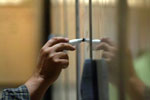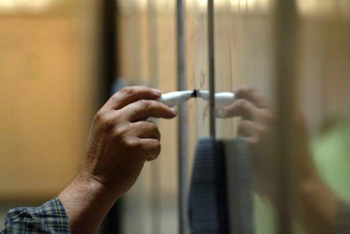 Wall Street Journal: Shortages, Layoffs and Inflation Fears Are Seen Four Months After U.N. Measures; a ‘Chaotic and Unpredictable’ Market
Wall Street Journal: Shortages, Layoffs and Inflation Fears Are Seen Four Months After U.N. Measures; a ‘Chaotic and Unpredictable’ Market
The Wall Street Journal
Shortages, Layoffs and Inflation Fears Are Seen Four Months After U.N. Measures; a ‘Chaotic and Unpredictable’ Market
By FARNAZ FASSIHI
 Iran’s economy is under increasing strain four months after the latest international sanctions against Tehran, say Iranian businessmen, traders and consumers, who describe spreading pain from inflation, joblessness and mounting shortages.
Iran’s economy is under increasing strain four months after the latest international sanctions against Tehran, say Iranian businessmen, traders and consumers, who describe spreading pain from inflation, joblessness and mounting shortages.
In interviews from within Iran, these people paint a picture of unsteady supply chains and disrupted exports. Ordinary Iranians say they worry they will be caught paying more for goods and services even as the government trims subsidies.
Iran’s Central Bank hasn’t released official gross domestic product, inflation and other data for three years. But anecdotally, these Iranians say, weaknesses in their economy appear to have been magnified since June, when the United Nations, European Union and U.S. began stepping up measures aimed at deterring Tehran’s nuclear program.
“Every morning, we go to work wondering how we will manage the day,” says Gholam Hossein, a Tehran brick-factory owner. “The market is chaotic and unpredictable. One day we can’t move our goods from the port. Another day we can’t open a letter of credit.”
An industrial-machinery importer says operating costs have risen at least 30% because of new shipping and insurance restrictions on Iran-bound cargo, costs to be passed on to consumers. A retired accountant in Tehran says her pension is now stretched thin. “Inflation is putting a lot of pressure on people,” she says. “It’s on everyone’s minds.”
The sanctions are an attempt to force Iran to reconsider its nuclear ambitions—which Tehran says are peaceful, but the U.S. and others say are directed toward weapons production. The measures have brought new scrutiny to shipping and financial transactions. Some foreign firms have suspended or limited their transactions with Iran.
Layoffs and worker strikes at state companies have been rarities in Iran. But a pharmaceutical company owner said he recently curbed production and laid off at least 40 employees because of the increasing time and cost of importing raw materials. Iran’s ILNA news agency, meanwhile, reported that last week workers walked off the job at government-owned factories—two tire plants and a cooking-oil maker— saying they hadn’t been paid in as long as four months.
“The economic crisis we are witnessing today is a direct result of the sanctions—and Iranian officials who say otherwise are fooling themselves,” said Mojtaba Vahidi, who served as a top-level manager for nearly two decades in Iran’s ministries of finance and industry. Mr. Vahidi was an economic adviser to a losing candidate in Iran’s last presidential elections and now lives in the U.S.
It is still too early to say whether new international measures will force the intended concessions. Iran has sizable hard-currency reserves to absorb shocks, and the isolation of its banking sector protected the country from the worst of the global financial crisis.
Iranian President Mahmoud Ahmadinejad told reporters in New York recently that the economy is healthy. He and other Iranian officials say Iran is adept at surviving sanctions and that the new measures will only make the country more self-sufficient.
But at least one emergency measure imposed by Tehran to limit the impact of its growing isolation has instead magnified the problem. Iran—which is oil-rich but is nonetheless a net importer of gasoline—said it would reconfigure its petrochemical plants to make gasoline after Washington targeted foreign supplies of the fuel in July.
Afshin Nourshahi, production manager of a privately owned industrial paint maker west of Tehran, said that in the past few weeks it has become difficult to buy chemical-based raw materials that are also used gasoline production. He has decreased production. “We are waiting to see if we can survive the crisis or we will be forced to close in the next few months,” he said.
Eisah Gharibi Kalbir, chairman of Iran’s plastic-industry union, which represents private businesses and hundreds of thousands of workers in negotiations with the government, said he expects prices of plastic items such as water bottles to double over the next few months because of the shortfall of raw materials.
In another apparent ripple effect from sanctions, Iran’s rial currency experienced its first major fluctuation in years. The dive began Sept. 29, when Iranian banks temporarily stopped selling dollars and euros. Private money-exchange shops, too, stopped selling as well, money traders said. Traders blamed the plunge—as much as 22% against the dollar—on difficulty in accessing foreign currency because of extra scrutiny by overseas banks.
“The channels for transferring money in and out of Iran have shrunk significantly over the past few months,” said the owner of a prominent Tehran money-exchange shop.
Iran’s Central Bank eventually stabilized the currency at around 10,700 rial to the dollar, close to its typical level, with an injection of foreign currency. At the same time, money traders say, Iranian authorities have also tightened their monitoring of capital leaving the country. “We are under tremendous amount of pressure,” said the money trader. “Every week someone comes in here demanding to look at our books.”
While Iran’s troubles appear to have been exacerbated by sanctions, much can also be traced to government economic policy. President Ahmadinejad, in his first term, spent lavishly and eased credit as part of a series of populist programs. Since then, lower oil prices have made such programs less sustainable.
The International Monetary Fund forecasts Iran’s economy will grow 1.6% this year, from 1.1% in 2009 and 1% in 2008 and 7.8% in 2007.
As part of its efforts to rebalance the economy, the government has in the past year proposed income-tax increases on traders in gold, steel, fabrics and other sectors, prompting several work stoppages by merchants. For more than two weeks, gold traders in Tehran and 12 other cities have been on strike, seeking to negotiate lower taxes.
Merchants say higher levies will exacerbate inflation that is already crimping consumers’ purchasing power. “We deal with people every day and know they are suffering,” says one merchant in Tehran.
The government is also considering cutting food and fuel subsidies, which could bring greater pain. A household of four now typically receives nearly $4,000 a year in government gas, oil and electricity subsidies, according to the IMF. Mr. Ahmadinejad fought for legislation, passed in January after a year of wrangling, to gradually phase out those subsidies and save about $100 billion a year.
Cuts that were set to take effect Sept. 23 but have since been delayed are expected to boost prices of subsidized food items such as wheat, rice, oil, milk and sugar. On Thursday, the government said it would deploy a task force to talk to merchants and consumers about how to introduce the plan with minimal pain.
Iran says it has brought inflation from above 25% in 2008—a time of regionwide overheating due to soaring oil prices—to under 10% this year. The IMF, too, estimates inflation is now about 10%, but warns that the subsidy cuts could send the rate to 30%.
Some economists and analysts, including Mr. Vahidi, say inflation is already over 25%. The government rejects those numbers.
Consumers are fearful. A 35-year-old lab worker in Tehran says nearly 80% of her family’s utility bill was covered by subsidies. “We have no idea how my husband and I can afford to pay this ourselves,” she said.
Some regime insiders, including former president Ayatollah Ali Akbar Hashemi Rafsanjani, have warned the regime not to downplay the impact of sanctions. Mr. Rafsanjani, a bitter rival of Mr. Ahmadinejad, remains a powerful force in Tehran’s conservative clerical leadership.
“I would like to ask you and all the country’s officials to take the sanctions seriously,” he told Iran’s Assembly of Experts, the country’s highest clerical body, in September. “And not as a joke.”


